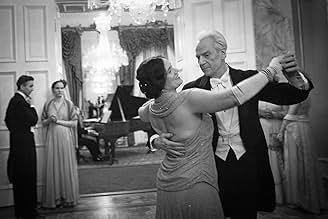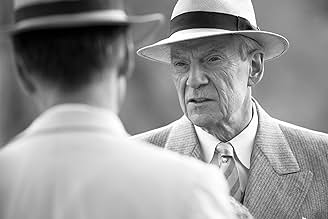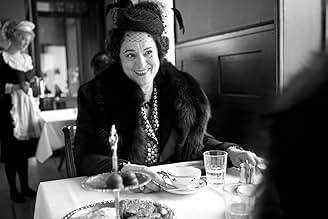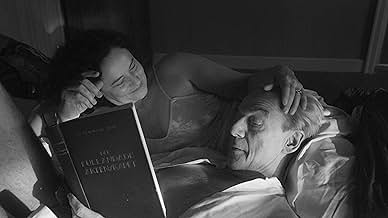Una storia basata sulla vita del giornalista Torgny Segerstedt, che allertò il pubblico svedese sulla minaccia del fascismo negli anni '30.Una storia basata sulla vita del giornalista Torgny Segerstedt, che allertò il pubblico svedese sulla minaccia del fascismo negli anni '30.Una storia basata sulla vita del giornalista Torgny Segerstedt, che allertò il pubblico svedese sulla minaccia del fascismo negli anni '30.
- Regia
- Sceneggiatura
- Star
- Premi
- 3 vittorie e 7 candidature totali
Recensioni in evidenza
Personal courage becomes a scarce commodity when the times get tough. And there weren't times much tougher than 1930's and the rise of Nazism. Europe stood paralyzed in an unlikely marriage of fear and denial. Veteran director Jan Troell tells a story of a public figure that bravely attacked Nazis in his newspaper column. Torgny Segerstedt was revered and much suspected. His principals made the others look corrupt and petty. And they were, but that is beside the point, because nobody has more concern about appearances than the immoral and tainted. The interesting quirk of this brilliant movie is that Torgny himself was a deeply flawed human being, in turns neglectful and cruel to his wife and kids. Somehow this man with such strong sense of morals, cared about the humanity in general, but alas, not for individuals. Well, that might be understandable. The messiness of humanity would try the patience off all saints combined. Our times prove that beyond any doubt.
7vsks
It was troubling to view Swedish director Jan Troell's 2012 film based on the experience of crusading journalist Torgny Segerstedt, so soon after the recent tragic assassinations at Charlie Hebdo in Paris. Segerstedt was editor-in-chief of one of Sweden's leading newspapers, and between 1933 when Hitler came to power and his own death in 1945, Segerstedt was a fierce opponent of Naziism, even though much of Sweden's leadership, including the king, was determined to remain neutral and out of the war. The struggle for journalists' right—some would say duty—to speak out despite risks to themselves and others has not ended. Beautifully played by Jesper Christensen, Segerstedt left himself open to criticism and to the devaluing of his motivations by his long affair with a Jewish woman, wife of his publisher. Hollywood's crusading journalists are noble and flawless (think All the President's Men), their presumed moral authority overshadowing any rough spots in their personalities, whereas Segerstedt's uncompromising character is pompous at times and unpleasant at others, he basks in his celebrity, and he's downright cruel to his wife. "Easy to admire, but very hard to like," said RogerEbert.com reviewer Glenn Kenny. Truth told, he loves his dogs best. Producing this film in black and white may have symbolic significance or may be just the preferred Scandinavian style—the film is Swedish, after all. In another Bergman-like touch, Segerstedt sees and converses with the black-clad ghosts of his mother and other women. Slow-moving, like the clear stream (of words?) against which the opening and closing credits appear, there is only a fleeting soundtrack to support the action. The film left me with a lot of unanswered questions. What happened with his writing? When the authorities demanded that a particular edition not be distributed because of its anti-Nazi editorial (which suggests they had imposed some censorship regime), Segerstedt printed it with a big white space where the editorial would have been. Nice. But we never learn whether he was allowed to continue writing after that (or how he was stopped) until a scene that takes place years later. How did the war affect the Swedish people? There's little hint of that, beyond putting up blackout curtains. It seems they had electricity, they had food, petrol, champagne at New Year's. It's primarily the awareness of Nazi behavior that the viewer brings to the film that explains and justifies both Segerstedt's simmering outrage and his country's policy of appeasement. He and his mistress both have suicide plans, if it came to that, but in the absence of any tangible, on-screen threat, their preparations seem self-dramatizing and almost childish. Segerstedt in a sense provides his own epitaph, which is also the Swedish title of the movie—"Judgment on the Dead"— based on a line from a famous Old Norse poem, which says the judgment on the dead is everlasting. History's judgment on Segerstedt would be that he was of course right about the Nazis. And if, as the King believed, it would have been his fault if the Germans invaded the country, he would have been among the first to die. NPR's Ella Taylor called the film "A richly detailed portrait of a great man riddled with flaws and undone by adulation."
I quite loved the movie in terms of cinematography - although rather slow at times. However I couldn't say I liked the character of Segerstedt, who appeared to me as a most spoilt, selfish and inconsiderate man. I don't even find him 'heroic' in the slightest: how much courage does it take to oppose and attack a foreign regime from another country? The list of Anglo Americans who went to fight (and lost their lives) in Spain in an attempt to oppose the establishment of Franco's regime is long. Those are heroes, not the verbally incontinent Segerstedt.
Jesper Christensen with his Danish accent isn't very credible in his role as the Swedish newspaperman Torgny Segerstedt, famous for his uncompromising anti-Nazi stance. And could Jan Troell be any more boring director? Instead of making a movie about a man who stould up for liberty and against nazism to a great cost for himself, the director Troell just zeros in on his personal life and mistresses.
Jan Troell is the nestor of Swedish films. He's been directing for 50 years and bringing on Torgny Segerstedt is of course an interesting choice of subject. Segerstedt was one of few journalists who completely stood up against Hitler during WW2. A story of courage in a special way, since Sweden never took part in the war.
So this could have been a discussion about common political morals, but instead it's a discussion about Segerstedt's private life and most of all his mistresses. Of course you can make a movie that way, if it has a substance referring to the man's work, but this isn't the case here. It's more about anybody's love life.
And there isn't any magic about it. The work should be bigger than the man than it comes to somebody like Segerstedt.
So this could have been a discussion about common political morals, but instead it's a discussion about Segerstedt's private life and most of all his mistresses. Of course you can make a movie that way, if it has a substance referring to the man's work, but this isn't the case here. It's more about anybody's love life.
And there isn't any magic about it. The work should be bigger than the man than it comes to somebody like Segerstedt.
Lo sapevi?
- QuizThis is the second movie in which Jesper Christensen and Pernilla August are parts in a wife-husband-mistress triangle. Here Pernilla August is the mistress, in Drabet (2005) she was the wife.
- BlooperIn the movie at a party which is supposed to take place 1938 the swedish song "Hur har du det med kärleken idag?" is played and also sung by the character Maja Forssman. This song is from 1945 and was then made popular by the famous swedish artist Ulla Billquist.
- Colonne sonoreFinlandia
Written by Jean Sibelius
I più visti
Accedi per valutare e creare un elenco di titoli salvati per ottenere consigli personalizzati
Dettagli
- Data di uscita
- Paesi di origine
- Lingue
- Celebre anche come
- The Last Sentence
- Luoghi delle riprese
- Aziende produttrici
- Vedi altri crediti dell’azienda su IMDbPro
Botteghino
- Lordo Stati Uniti e Canada
- 62.506 USD
- Fine settimana di apertura Stati Uniti e Canada
- 9020 USD
- 22 giu 2014
- Lordo in tutto il mondo
- 328.005 USD
- Tempo di esecuzione
- 2h 6min(126 min)
- Colore
- Proporzioni
- 1.78 : 1
Contribuisci a questa pagina
Suggerisci una modifica o aggiungi i contenuti mancanti

































